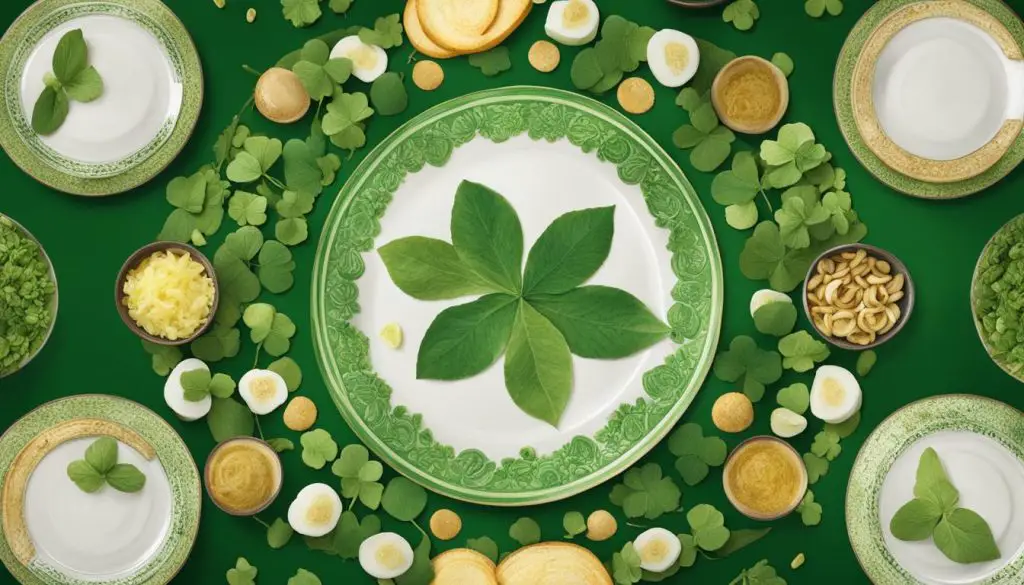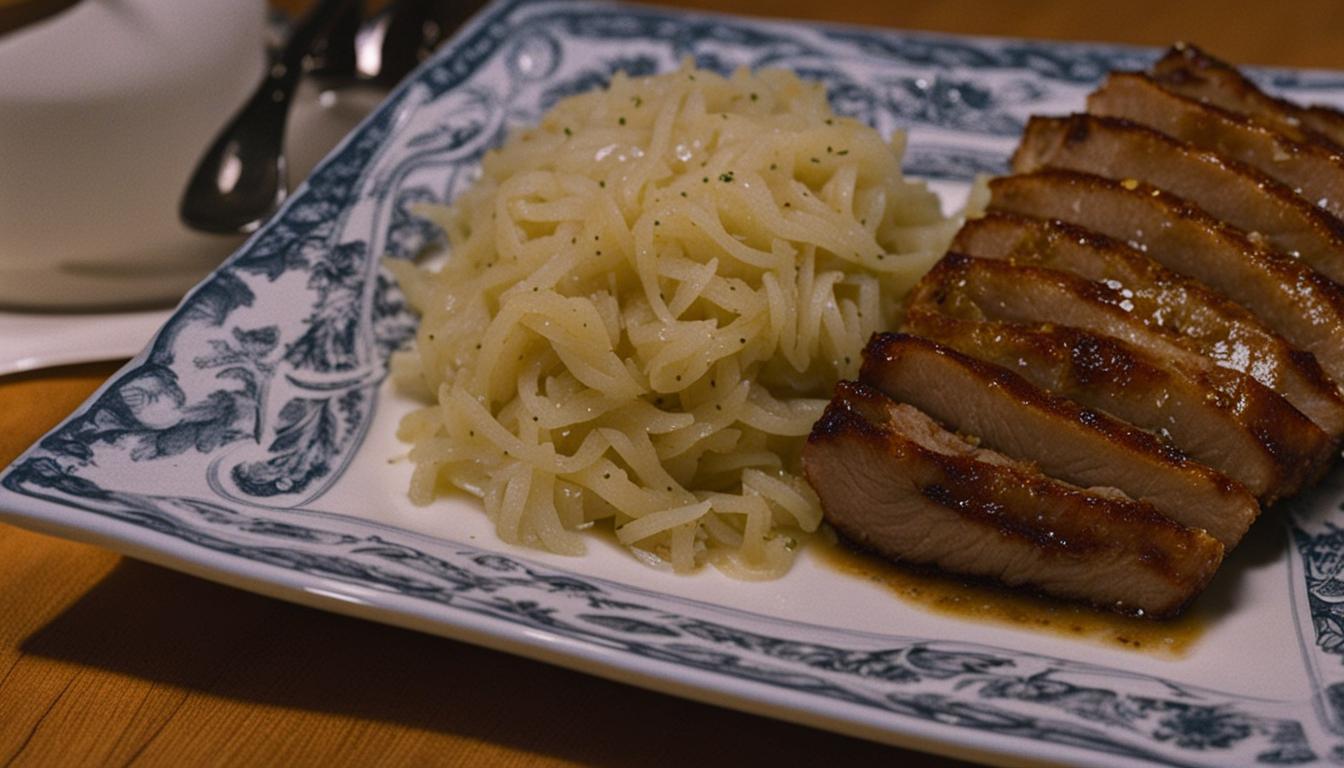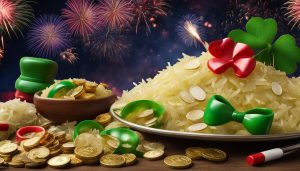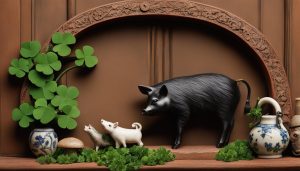Germans have been eating pork and sauerkraut on New Year’s for generations because they believe it brings good luck. This tradition was brought to the United States by German immigrants in the 17th and 18th centuries. Legend says that pork is enjoyed because pigs root forward for food, symbolizing looking ahead to the new year. Eating sauerkraut is believed to bring as much wealth as there are shreds of cabbage in the dish.
Contents
- 1 The Practical Magic of Sauerkraut on New Year’s Day
- 2 German Tradition: The Origin of the Pork and Sauerkraut Tradition
- 3 Why Pork for New Year’s?
- 4 Conclusion
- 5 FAQ
- 5.1 When is it traditional to eat pork and sauerkraut?
- 5.2 Why is sauerkraut considered lucky?
- 5.3 Where did the tradition of eating pork and sauerkraut come from?
- 5.4 Why is pork associated with good luck?
- 5.5 Why is sauerkraut served on New Year’s Day?
- 5.6 What are some other lucky foods for the New Year?
- 5.7 How can I incorporate luck and good fortune all year long?
- 6 Source Links
Key Takeaways:
- Eating pork and sauerkraut on New Year’s is a tradition for good luck.
- German immigrants brought this tradition to the United States.
- Pork symbolizes looking ahead to the new year, while sauerkraut is associated with wealth.
- This practice has been passed down through generations.
- The dish is believed to bring good fortune and prosperity.
The Practical Magic of Sauerkraut on New Year’s Day
While eating pork and sauerkraut on New Year’s Day is said to bring good luck, sauerkraut itself also offers practical benefits. For generations, Germans recognized the digestive and immune-boosting properties of sauerkraut, making it a staple in their New Year’s Day meal. Today, starting the new year with sauerkraut is seen as a healthy tradition.
The fermentation process of sauerkraut creates probiotics, which are beneficial bacteria that support digestion and overall gut health. These probiotics aid in breaking down food and absorbing nutrients, providing relief from any discomfort caused by indulgent holiday feasts. Additionally, sauerkraut is rich in vitamins C and K, as well as minerals like potassium and calcium, which can strengthen the immune system and contribute to overall well-being.
So, as you gather around the table for your New Year’s Day meal, consider adding a scoop of sauerkraut to your plate. Not only will you be honoring a long-standing tradition of good luck, but you’ll also be nourishing your body with a healthy and delicious dish.
Benefits of Sauerkraut on New Year’s Day:
- Supports digestion and gut health through probiotics
- Boosts the immune system with essential vitamins and minerals
- Relieves discomfort from indulgent holiday meals
- Contributes to overall well-being
Recipe: Sauerkraut Salad
“This simple sauerkraut salad is a refreshing and healthy addition to your New Year’s Day feast. Combine sauerkraut with thinly sliced apples, fresh dill, and a tangy dressing made from olive oil, apple cider vinegar, and whole grain mustard. Serve chilled for a flavorful and probiotic-rich side dish!” – Chef Julia
| Ingredients | Instructions |
|---|---|
| 2 cups sauerkraut | 1. In a large bowl, combine sauerkraut, thinly sliced apples, and chopped fresh dill. |
| 1 apple, thinly sliced | 2. In a small bowl, whisk together olive oil, apple cider vinegar, whole grain mustard, salt, and pepper to taste. Pour the dressing over the sauerkraut mixture and toss gently to coat. |
| 2 tablespoons fresh dill, chopped | 3. Cover the bowl and refrigerate for at least 1 hour to allow the flavors to meld. Serve chilled as a side dish with your New Year’s Day meal. |
| 2 tablespoons olive oil | |
| 1 tablespoon apple cider vinegar | |
| 1 tablespoon whole grain mustard | |
| Salt and pepper, to taste |
German Tradition: The Origin of the Pork and Sauerkraut Tradition
German immigrants brought the tradition of eating pork and sauerkraut to the United States, particularly to regions with high populations of Germans, such as Pennsylvania Dutch country and the Midwest. This centuries-old tradition holds significance not only in Germany but also in various cultures with pig-raising traditions, including those of Czech, Hungarian, and Polish ancestry.
In Pennsylvania Dutch country, known for its strong German influence, the consumption of pork and sauerkraut on New Year’s Day is deeply rooted in tradition. Families gather together to enjoy this hearty dish, believing that it will bring good luck and prosperity for the year ahead.
The Midwest, another region that saw a significant influx of German immigrants, also embraces the pork and sauerkraut tradition. This beloved culinary custom has become a cherished part of the Midwest’s cultural fabric, symbolizing the connection to German heritage and celebrating the start of the new year with hopes of good fortune.
The Significance of Pork and Sauerkraut
“The tradition of eating pork and sauerkraut is more than just a meal; it represents our heritage and the hope for a prosperous year.”
This enduring custom of consuming pork and sauerkraut is deeply intertwined with cultural symbolism and superstition. Pigs are associated with forward movement and abundance because they root forward for food, symbolizing progress and prosperity. Additionally, the tangy and fermented sauerkraut, made from cabbage, is believed to represent wealth as there are shreds of cabbage in the dish. This combination of pork and sauerkraut on New Year’s Day is believed to ensure a year filled with good luck and financial success.
As families gather around the table to enjoy this flavorful tradition, they take part in a cultural practice that highlights the rich heritage of German immigrants and brings a sense of unity and hope for the future. The origins of the pork and sauerkraut tradition may date back centuries, but its meaning and significance continue to resonate with families across generations.
Why Pork for New Year’s?
Pork is considered a popular choice for New Year’s Day because of its association with good luck and prosperity. The tradition of eating pork on this day has deep roots in various cultures and is believed to bring positive energy for the year ahead. Here are some reasons why pork is seen as a good luck charm:
- The symbolism of pigs rooting forward for food represents moving forward into the new year. This visual representation of progress aligns with the belief that consuming pork will bring you forward in life.
- The richness and fat content of pork are associated with abundance and prosperity. Eating pork is seen as a way to attract financial success and ensure a bountiful year.
- Round foods are often considered lucky, and many pork dishes are served in round shapes. The roundness symbolizes coins, further emphasizing the desire for wealth and good fortune.
So, when you enjoy a delicious pork dish on New Year’s Day, you are not only savoring a tasty meal but also embracing the belief in luck and prosperity that has been passed down through generations.
Table: Symbolism of Pork for New Year’s
| Symbolism | Meaning |
|---|---|
| Pigs rooting forward | Moving forward into the new year |
| Richness and fat content | Associated with abundance and prosperity |
| Round shape | Symbolizes coins and good fortune |
Embrace the tradition of consuming pork on New Year’s Day and invite luck and prosperity into your life. With each bite, you’ll be savoring more than just a delicious meal; you’ll be indulging in the belief that the year ahead will be filled with good fortune and success.

Conclusion
Eating pork and sauerkraut on New Year’s Day is a cherished tradition that has been passed down for generations. This delightful combination of flavors not only brings joy to the palate but is also believed to bring good luck and prosperity to those who partake in it.
Originating in Germany and brought to the United States by German immigrants, this tradition holds a special place in the hearts of many. The symbolism of pork, with its forward-rooting nature, represents moving forward into the new year with optimism and hope. Combine that with the belief that sauerkraut brings as much wealth as there are shreds of cabbage in the dish, and you have a recipe for a lucky start to the year.
But the luck doesn’t stop there. Incorporating other lucky foods into your New Year’s Day meal can amplify the positive energy and set the tone for a year filled with good fortune. Enjoy ring-shaped cakes and doughnuts that symbolize coming full circle, lentils that resemble coins, and dark leafy greens that resemble money. Cornbread can be cut into squares to resemble bars of gold, while pomegranates, a symbol of life and abundance, are enjoyed in Greece.
So as you gather around the table on New Year’s Day, remember the traditions and beliefs that have been passed down through generations. Enjoy the delicious flavors of pork and sauerkraut, and incorporate other lucky foods into your meal. By doing so, you are not only savoring a delicious feast but also inviting good luck and prosperity into your life for the year ahead.
FAQ
When is it traditional to eat pork and sauerkraut?
It is traditional to eat pork and sauerkraut on New Year’s Day for good luck.
Why is sauerkraut considered lucky?
Sauerkraut is considered lucky because it is believed to bring wealth and prosperity in the new year.
Where did the tradition of eating pork and sauerkraut come from?
The tradition of eating pork and sauerkraut originated in Germany and was brought to the United States by German immigrants.
Why is pork associated with good luck?
Pork is associated with good luck because pigs root forward for food, symbolizing moving forward into the new year. The richness and fat content of pork are also associated with prosperity.
Why is sauerkraut served on New Year’s Day?
Sauerkraut is served on New Year’s Day because it is connected to cabbage, which is a round and green vegetable symbolizing luck and financial prosperity. The fermentation barrels for sauerkraut are typically tapped around the New Year when fresh produce is scarce.
What are some other lucky foods for the New Year?
Other lucky foods for the New Year include ring-shaped cakes and doughnuts, lentils, dark leafy greens, cornbread, and pomegranates.
How can I incorporate luck and good fortune all year long?
You can incorporate luck and good fortune all year long by continuing to enjoy lucky foods and traditions throughout the year.





